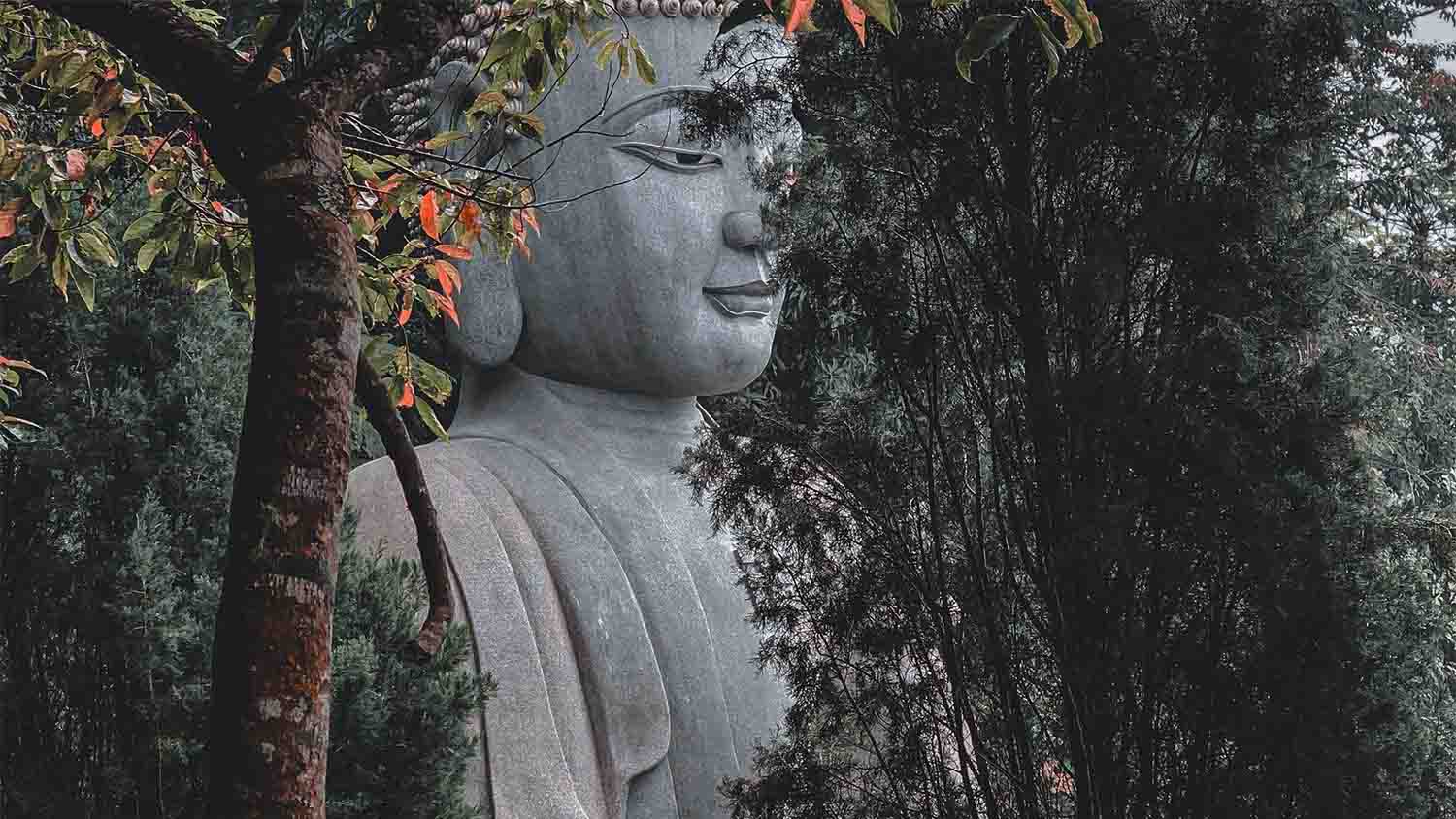Self-discovery is the process of asking oneself, “Who am I?” The desire to answer this question is one of the most powerful motivations for spiritual practice.
Despite its modern reputation as a physical and mental wellness tool, meditation is primarily a device for self-discovery. Health benefits can come from meditation, but they do not need to be its goal.
What Is Self Discovery? — Exploring the Concept of Self
The definition of self-discovery depends on the notion that there is a pre-existing self to find—as opposed to a self you want to create, a future self.
One interesting question you can ask is: what is the self that creates a future self?
And the answer is: the self that creates a future self is a self with 3-5 core values, a singular purpose, and an ambitious vision or goal. To explore this topic in more depth, checkout Dr. Benjamin Hardy’s easy-to-read-best-selling book, published in 2020: Personality Isn’t Permanent.
Thus, self can be thought of as that which sits at the center of a dynamic activity in which will, values, purpose, and vision are brought together in a cohesive narrative, a cohesive life story. The self is not a personality, but that which authors one’s story.
As fun as they can be to contemplate, the notion of fixed selves like those in the Meyer’s Briggs personality tests, astrological star signs, or Enneagram types (there are nine), can make you passive and fatalistic, causing more harm than good because personality typing systems suggest that nothing can be done to fundamentally change who or what you are.
Therefore, it’s important to know that while personality types and typing systems might help in a certain time or place, they have no scientific basis, and serve more as taxonomies of social and cultural types than as fixed truths.
So, the self you discover is often the self you want to find as well as a result of the self-interpretive lens through which you choose to perceive yourself.
In non-spiritual, material, or ecomonic views, the description of self is fact-based, quantifiable, and objective. The self is your flesh and blood, with such and such a weight, heart-rate, and blood cell count, or the information on your identification cards, or your net-worth statement, assets, and job-titles.
But as you depart from the view of self as that which is indicated by purely physical, quantifiable facts, the concept of self becomes rich and complex. Indeed, the “Who am I?” question branches into inquiries of purpose, role, and responsibility.
Before you meditate on these aspects of self, consider which philosophical framework will best guide you on your path to self-discovery.
You may choose any view that satisfies you, or you may invent your own. Perhaps Aristotle’s notion that your purpose as a human is to live a virtuous life appeals to you. Or, maybe Buddhism’s idea that you are Buddha Nature and that your purpose is to realize yourself as such offers the most interesting view of spiritual purpose.
Do not choose how to look at yourself based on obligation or pressure. Because only authentic choices will lead you to an authentic self.
Self-discovery should be a pleasant experience that provides both enjoyment and sustenance.
If you were raised in a religious community, you do not need to include those teachings in meditation, but you can if you want to.
Making a living by doing what you love, for example, can be a reward from self-discovery. Another potential outcome is increased creativity. No matter the specific result, you’ll know you’ve succeeded at finding and creating yourself when you feel balance, harmony, and deep satisfaction in your life.
There are also practical benefits to the pursuit of self-discovery. When people know their purpose, they are able to become more powerful and take control of their lives. Also, studies have shown that a coherent sense of self makes for better health.
And, if you don’t define yourself and purpose, you will be vulnerable to oppressors, to others—stronger people—who will define it for you. These people know their purpose. But, instead of employing their power in a magnanimous way, to help others realize their own purpose, they use others, targeting and subjugating people who are not interested in self-discovery.
If you discover your purpose through an enlightening spiritual path you’ll lift up both yourself and those around you.
This result will cause a ripple effect that inspires others to do the same.
7 Tips to Help you Embark on a Journey of Self-Discovery
Self-discovery must include a foundation of individual effort and introspection, but the journey can involve other people.
You are reading this article because you want advice to fuel your individual effort, so we are here to help.
Practicing even one of these seven tips should move you toward a sense of purpose.
Also you can sign up for our Free Quickstart Guide to Mediation. Doing the mediations or one of the exercises will help you get started.
1. Visualize Your Ideal Self
Some people start with their ideal self hidden in the dark. It’s there, but they can’t see it. These methods and questions are sparks that will gradually illuminate the complete image of the ideal self.
Who do you want to be? What does that person feel like? What is that person doing?
If envisioning the future does not cast any sparks, reminisce. Were there times when you felt like your ideal self? Were there experiences that made you feel like your ideal self? What were you doing then?
For an activity-based approach, try reading. There are millions of books that contain accounts of great lives and accomplishments from people who attempted self-discovery over the course of thousands of years. Their stories will enrich and catalyze your imagination.
2. Find Out What Makes Your Heart Sing
Throughout even the most mundane, routine day, there are dozens of little activities and tasks you engage in that trigger a range of emotions. Document them, and rate the feeling on a scale of energy from zero to 10. Practice this for many days, and eventually a pattern will emerge.
If you’re struggling with this exercise, here are some tips:
- Think about your five senses: touch/feeling, smell and taste, hearing and sight. What brings joy to these five senses?
- It’s OK if your answers are simple.
- If regularly documenting feels like too much work, start with a list.
3. Meditate on Other Questions
As we mentioned earlier, the “Who am I?” question is the center of a massive web with many curiosities. Each question leads to another thread, another crossroads with more questions. The more you ask and answer, the more you’ll move toward self-discovery.
Here’s an example:
What do I want to do for a living? How can I make a living doing that? Would I be willing to settle for something else? If I did settle, would I still have time for what I love?
4. Think big, have confidence in your success, but don’t lose site of the brutal facts
Self-discovery is an ambition, as well as a path that is paved with smaller subgoals.
When you map out your journey, have an ambitious goal, and maintain the confidence that you’ll succeed. At the same time, be honest about your progress points and any brutal facts so that you can alter what’s necesarry in order to succeed.
Are you thinking big?
If your goal feels easy, it’s most likely too small.
Anyone can spend a few minutes a day taking a few deep breaths. But maintaining a breathing practice as a routine is more like maintaining an athletic exercise—it’s great for your health, but it’s not a goal that’s likely to significantly transform your self without deeper study.
Overcoming suffering, on the other hand, is an incredible motivator because to do so often requires a difficult journey of self transformation. You might need to solicit help from others and spend many years studying, meditating, reflecting, and realizing a future self in order to heal and to be the self you want.
Your desire to transform yourself, to flourish, to thrive, and to grow is natural. Such a desire shouldn’t be a target of criticism.
If you struggle during the pursuit of self-discovery, resist the urge to believe there is something wrong or missing in you.
5. Write in a Gratitude Journal
Unfortunately, most of our natural thoughts are negative. Gratitude is an emotion, but also a practice that can correct our cynicism.
When achievements are significant and positive, use them to fortify your mind by writing in a gratitude journal.
If you have privileges or instances of good luck, don’t feel guilty about them. Be grateful that there will be advantages to aid in your journey.
If you want more detailed instructions, try this exercise from the Greater Good Science Center at the University of California, Berkeley. It only takes 10 minutes a day.
Remember to be honest about what you are grateful for. Writing down what you feel you should be thankful for is different than having authentic emotions.
As you record these thoughts, you’ll see patterns and discover more about yourself. Do you tend to be grateful for relationships, activities, nature?
6. Indulge in New Experiences
Similar to reading, experiences are catalysts for imagination and self-reflection. Conversely, new experiences can help people get out of their heads during anxious times.
Set aside time to go out and do something new. Remember what we said earlier: self-discovery can be enjoyable!
Don’t have a lot of free time? Know that something as simple as a walk around the neighborhood can contain new, inspiring experiences. Here’s another recommended exercise from UC Berkeley.
As with all of our advice, approach this practice with balance and an honest view of what is healthy. Dedicating too much time to novelties can become a distraction from deeper issues.
We also recommend avoiding an excess of consumer goods and purchased experiences. It’s counterproductive to feel like self-discovery is something you can buy.
7. Try a Spiritual Life Coach
Not everyone knows what they’re seeking, but spiritual life coaching can help you to rediscover who you are once again, and pinpoint your life’s purpose.
Alternatively, you might find solace in one of our group coaching classes. Imagine a limitless, interactive archive of these types of articles. That’s part of what our group coaching provides. If you follow our recommendation of having a big, difficult and ambitious goal for your self-discovery, you might need the support.
A class structure will also help you stay balanced and accountable as you meditate and learn about yourself. It’s pretty rare for a person to be born with that kind of discipline.
Indeed, even the Buddha had teachers, and all heroes meet a guide who helps, guides, and encourages the hero to complete her journey.





